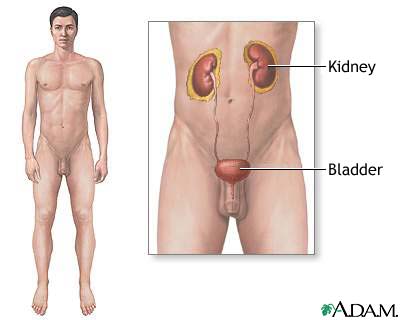Treatment
The goals of treatment include monitoring and controlling progression of the disease and treating the symptoms. Most important is to strictly control blood pressure.
Treatment of chronic kidney failure may become necessary. This can include dietary modifications, fluid restriction, and other treatments. Ultimately, chronic kidney failure progresses to end-stage kidney disease, requiring dialysis or transplantation.
Surgical repair of cataracts (cataract extraction), or repair of the anterior lenticonus in the eye may be needed.
Loss of hearing is likely to be permanent. Counseling and education to increase coping skills can be helpful. Learning new skills such as lip reading or sign language may be of some benefit. Hearing aids are helpful. Young men with Alport syndrome should use hearing protection in noisy environments.

Genetic counseling may be recommended because of the inherited pattern of the disorder.
Prognosis (Expectations)
Women usually have a normal life span with no signs of the disease except for blood in the urine. Rarely, women will have high blood pressure, swelling, and nerve deafness as a complication of pregnancy.
In men, deafness, visual difficulties, and kidney failure are likely by age 50.
Complications
* Chronic renal failure
* Decrease or loss of vision
* End-stage renal disease
* Permanent deafness
Calling Your Health Care Provider
Call for an appointment with your health care provider if your symptoms suggest Alport syndrome, or if you have a family history of Alport syndrome and you are planning to have children.
Call your health care provider if your urine output decreases or stops or if you see blood in your urine. This may be a symptom of chronic kidney failure.
Alport syndrome: Overview, Causes
Alport syndrome: Symptoms & Signs, Diagnosis & Tests
Alport syndrome: Treatment
Review Date : 11/30/2009
Reviewed By : David C. Dugdale, III, MD, Professor of Medicine, Division of General Medicine, Department of Medicine, University of Washington School of Medicine; Herbert Y. Lin, MD, PHD, Nephrologist, Massachusetts General Hospital; Associate Professor of Medicine, Harvard Medical School. Also reviewed by David Zieve, MD, MHA, Medical Director, A.D.A.M., Inc.
